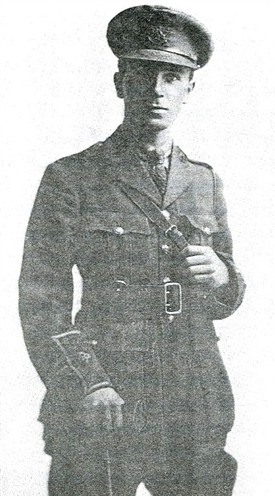MORRIS, Glynne (of West Bridgford)

2nd L/CPL J.G. Morris (1894-1917)
Sherwood Foresters
16th Btn., Notts & Derbys Regiment
Born 1894, Died 1917
Glynne Morris of 46 Stratford Road, West Bridgford near Nottingham, volunteered for military service in the Sherwood Foresters.
A series of letters he wrote between 1916 and 1917 survive, recording aspects of his wartime experiences. The originals are deposited at Nottinghamshire Archives (Ref. DD873/1-32) and are partially transcribed in the book "Sunken Roads" by Nicholas Clark (Nottingham: Erran Publishing, 1989) from which the following notes are taken by permission.
At the start of his war service Morris was stationed at a training camp at South Somercotes in Lincolnshire. Recording his impressions upon arrival he wrote "I arrived here in due course and Ye Gods! What a hole! There is absolutely nothing to do in your leisure and the country is painfully uninteresting". Being close to Nottingham, however, he was at least able to travel home on leave quite frequently.
As time wore on he began to appreciate more of what country life in Lincolnshire had to offer ("Two fresh eggs ...for breakfast ...and fresh milk and butter also") and even the charms of the wide, flat landscape ("There is no rise ...in the ground as far as the eye can see").
After about three months in Lincolnshire, Morris - now aged 22 - was posted to Newmarket for further training to officer standard. The differences between his new billet and Lincolnshire were immediately apparent: "We mess in style", he writes, "Like officers ...I think there is a vast amount of hard graft ahead of me, but now we are to be treated as men we can work as such".
No further letters survive from this period and six months passes until the series recommences in June 1917. By this time Morris had moved to France as a fully fledged Lance Corporal serving with the Sherwood Foresters in the BEF (British Expeditionary Force).
He writes of arriving at the Front Line trenches on 20th June 1917 to the sound of "the Hun" strafing continuously. Thereafter his first night passed off peacefully enough until one shell came "especially close and awakened me, but it didn't matter as it was breakfast time".
"Fritz bombed us here last night but as we were all here this morning it is safe to assume he didn't hit us..."
To his surprise, time at the front intially hung heavy, with ample occasion for letter writing. For a time he wrote almost daily, although it was not long before be began to note (albeit good-humouredly) such intrusions as being about to come under attack from "Zeps ...No rest for the wicked".
Towards the end of July 1917 Morris' letters begin to hint at secret training - probably for the offensive in Flanders which began on 31st July that year. "I pray to God that He will give me courage ...and wisdom to bring my men safely through....If it is God's will that I go under then it is for the best..."
By the time of the following letter the battle had taken place. It was a full two days before Morris was pulled out and sent behind the lines for a rest. Still unable to report on the details of the conflict he nevertheless commented that it was "the most awful and ghastly affair imaginable".
Of his men, they had been "simply great. I was awfully proud to lead such men". Finally, of the conflict he states "Everyone proclaims it to be the greatest battle of the war and as such the greatest battle in the history of the world".
Back in the trenches, on 13th September 1917 Morris was admitted to the 10th Corp. Advanced Operating Centre of the BEF (British Expeditionary Force) with severe abdominal wounds.
"Dear Mrs. Morris, Your wire came this morning just an hour too late, your dear boy having passed peacefully away at 9.00. Sister Rickard was with him and took this little piece of hair for you. She also put some white flowers in his hands in your name..."
From: War Office, London ...Deeply regret to inform you Lieut. J.G. Morris Sherwood Foresters died of wounds Sept. twenty third. The Army Council express their sympathy. Signed: Secretary, War Office
If you can add any further biographical or service information, please do so via the 'Comments' link below